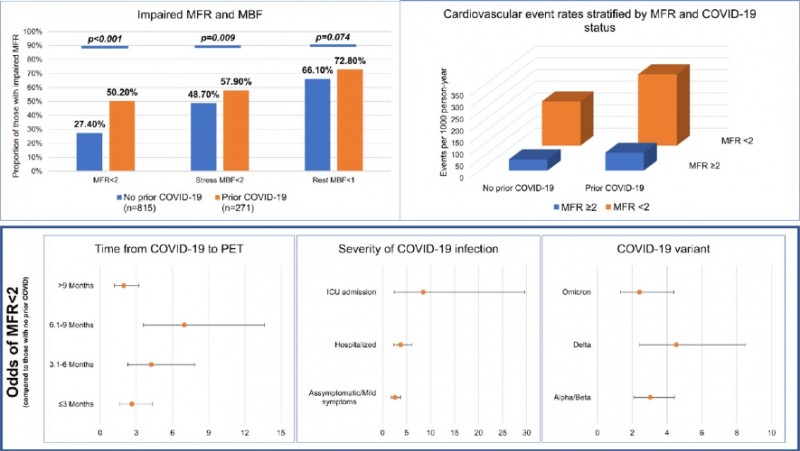COVID Variant, Severity of Illness Influence Cardiac Dysfunction
Images

Patients were more likely to experience heart issues associated with long COVID if infected with the beta and delta COVID-19 variants, as well as those who required hospital stays for COVID-19 infection, according to a recent Houston Methodist study published in the European Heart Journal –Cardiovascular Imaging. Patients recovering from the omicron variant were least likely to have microvascular involvement.
“This new data expands our understanding of myocardial flow reserve as an important prognostic marker in general and specifically in COVID-19,” said Mouaz Al-Mallah, MD, corresponding author of the study and director of cardiovascular PET at Houston Methodist DeBakey Heart and Vascular Center.
“This is good news for individuals who had omicron and are concerned about long COVID. Patients with lingering symptoms such as chest pain or shortness of breath following a severe infection may want to have a PET scan with blood flow assessment to check for microvascular dysfunction,” said Al- Mallah, who is also the current president of the American Society of Nuclear Cardiology. The study also found that microvascular dysfunction started to be seen less often after nine months to one year following infection suggesting that this type of abnormality may be reversible.
The American Society for Nuclear Cardiology’s PET scan guidelines now recommend including blood flow assessment routinely.
Last year, Al-Mallah and team published an initial study in JACC: Cardiovascular Imaging examining the coronary microvasculature health of 393 patients, including 101 with prior COVID-19 infection who had lingering symptoms. This was the first published study linking reduced blood flow reserve in the heart and COVID-19.
With over 600 million confirmed cases and nearly seven million deaths, the COVID-19 pandemic has left a lasting mark on the world. While the World Health Organization (WHO) ended the global health emergency declaration in May, long COVID remains largely a mystery.
According to Al-Mallah, more studies are needed to further assess the microvascular health of patients with prior COVID-19 and identify how these findings could influence patient care in the context of long-haul COVID-19.
Related Articles
Citation
COVID Variant, Severity of Illness Influence Cardiac Dysfunction. Appl Radiol.
June 6, 2023